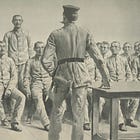Milstack Saturday (26 October 2024)
The best articles on military subjects I read (or listened to) in the past week
Find Your Next Read helps me to scan the horizon for books that might have something interesting to say about ‘the armies that are, the armies that were, and the armies that might have been’. The same newsletter that provides that service also introduced me to Washington's Marines. (I have yet to finish the latter. However, I have already found much to like in the book, to include solid research, a fluent writing style, and the setting of story of the Continental Marines within the larger context of the American War of Independence.)
Forgotten Archives of History, which made its debut a little less than a year ago, reminds me of Ridgeway’s Notebook. Both dive deeply into a highly specific aspect of the US Army of the Second World War. (Where Ridgeway’s Notebook draws its material from the annals of the airborne forces, Forgotten Archives recounts the history of the glider pilots who helped to deliver them.)
Speaking of the Second World War … I have thoroughly enjoyed the twenty episodes that the History of the Second World War Podcast recently devoted to the German invasion of the Low Countries in 1940
Speaking of podcasts … The Connecting File is looking for a podcast editor.
Did I miss anything? Please use the comments section to post links to recently published articles that might interest readers of The Tactical Notebook.
For Further Reading:
To Subscribe, Share, or Support:










Wargames long the realm of top brass and classified plans—let strategists test varying scenarios, using different tactics and equipment. Now they are filtering down the ranks and out among analysts. Digitization, boosted by artificial intelligence, helps yield practical lessons in greater safety and at lower cost than staging military maneuvers would. Wargames can also explore hypotheticals that no exercise could address, such as nuclear warfare.
Proponents of wargames include Tim Barrick, a retired Marine colonel who is now wargaming director at Marine Corps University. He drills students using board games and computers. In one online exercise, he pushed eight Marine majors repeatedly through the same Pacific military engagement, using a program called Command: Professional Edition.
This software is unusual because it didn’t originate with a defense contractor or institute, as most wargames do. It is a simulation program built and marketed by gamers with almost no military background—and rooted in Tom Clancy novels. Users of all stripes have made it a surprise hit.
https://www.wsj.com/politics/national-security/a-million-people-play-this-video-wargame-so-does-the-pentagon-e6388f50?st=K1F3qc&reflink=article_copyURL_share